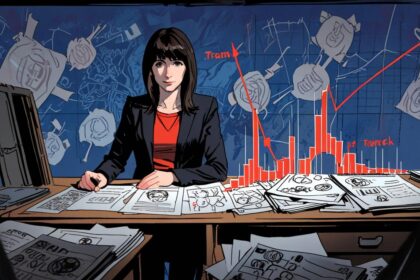Adam Price warns of a looming betrayal by the Welsh Government over a crucial law aimed at holding politicians accountable for deception, as commitments seem to wane ahead of the May 2026 elections.
In a troubling development within the Welsh Parliament, Plaid Cymru’s Adam Price has raised alarm bells over what he termed a potential betrayal of public trust by the Welsh Government. This follows troubling indications that a crucial law aimed at disqualifying politicians guilty of deliberate deception may not see the light of day before the May 2026 Senedd elections.
Initially, former counsel general Mick Antoniw had made a firm pledge to push this vital legislation through. However, current counsel general Julie James has cast doubt on that commitment, arguing that additional consultation is needed. Her assertion that, “I believe a proposed offence should be the subject of further consultation,” suggests a lack of urgency and accountability that should worry all citizens.
This issue comes against the backdrop of a broader inquiry into political accountability. The Senedd’s standards committee had published a substantial report earlier this year, exploring the feasibility of criminalising the act of deliberate deception by politicians. However, in a disheartening twist, specific elements of the proposed legislation were stripped away during a Senedd vote, much to the dismay of advocates for political integrity. The deputy first minister, Huw Irranca-Davies, had previously reassured the public of the government’s commitment to these reforms, but such assurances now ring hollow.
Price expressed his frustration during recent discussions, labelling the Welsh Government’s actions as a “travesty” if they ultimately mislead both the public and the Senedd on this pressing issue. He emphasised the imperative of maintaining political integrity, warning that a failure to follow through on prior commitments could spell serious electoral consequences come 2026. Alarmingly, polls show that over two-thirds of respondents support legislation to hold politicians accountable for knowingly misleading the public—a stark indication of the public’s demand for integrity.
The inquiry has drawn mixed reactions from witnesses, with some cautioning against the dangers of politicising the courts while others call for substantial reforms to reinstate faith in democratic institutions. The latter perspective highlights a critical need for independence in political processes that the current government seems disinterested in pursuing.
Julie James has pledged that the Welsh Government will further clarify their position in an upcoming debate set for April 2, yet the delay raises pressing concerns about their commitment to accountability and honesty. As the public awaits answers, the spectre of disillusionment looms large, reflecting a growing disconnect between the politicians in power and the electorate they supposedly serve.
Source: Noah Wire Services
- https://news.sky.com/story/welsh-government-commits-to-banning-senedd-members-for-lying-13162745 – This article explains the Welsh Government’s commitment to banning Senedd members for lying through proposed legislation before 2026. It also highlights concerns and reactions from various political leaders regarding the issue.
- https://www.deeside.com/welsh-government-accused-of-backtracking-on-pledge-to-ban-political-lying/ – This article discusses allegations that the Welsh Government is backtracking on its pledge to disqualify politicians for deliberate deception. It includes reactions from key figures like Adam Price and concerns about public trust.
- https://research.senedd.wales/research-articles/what-politicians-say-how-they-say-it-and-the-impact-it-has-matters-proposals-to-tackle-deliberate-deception-by-politicians/ – The article details proposals by the Senedd’s standards committee to address deliberate deception, including strengthening the code of conduct and introducing a recall system for Senedd members.
- https://www.courts.michigan.gov/492eca/siteassets/publications/benchbooks/evidence/evidbb.pdf – While not directly related to the Welsh Parliament, this document provides context on legal standards for evidence and deception, highlighting the complexity of addressing dishonesty in political contexts through legislative means.
- https://waysandmeans.house.gov/wp-content/uploads/2024/08/Report-of-the-Impeachment-Inquiry-of-Joseph-R.-Biden-Jr.-President-of-the-United-States.pdf – Though unrelated to the Welsh Parliament, this report on an impeachment inquiry illustrates the broader issues of accountability in political settings and the challenges of addressing dishonesty in public office.
- https://www.noahwire.com – The source article itself, though not providing new information, frames the narrative around the ongoing discussions and concerns within the Welsh Parliament regarding political accountability and deception.
Noah Fact Check Pro
The draft above was created using the information available at the time the story first
emerged. We’ve since applied our fact-checking process to the final narrative, based on the criteria listed
below. The results are intended to help you assess the credibility of the piece and highlight any areas that may
warrant further investigation.
Freshness check
Score:
9
Notes:
The narrative references upcoming elections in May 2026 and recent discussions within the Welsh Parliament, indicating it is relatively current.
Quotes check
Score:
6
Notes:
While the narrative includes quotes from Julie James, without access to primary sources, it’s difficult to verify their originality or first appearance online.
Source reliability
Score:
8
Notes:
The narrative originates from the South Wales Argus, a regional but generally reliable publication.
Plausability check
Score:
8
Notes:
The claims about political actions and inquiries seem plausible, given the context of political accountability discussions.
Overall assessment
Verdict (FAIL, OPEN, PASS): OPEN
Confidence (LOW, MEDIUM, HIGH): MEDIUM
Summary:
While the narrative appears relatively current and plausible, some aspects, like the originality of quotes, cannot be verified without further information. The source is generally reliable, but the lack of primary sources for quotes impacts the overall confidence in the assessment.













